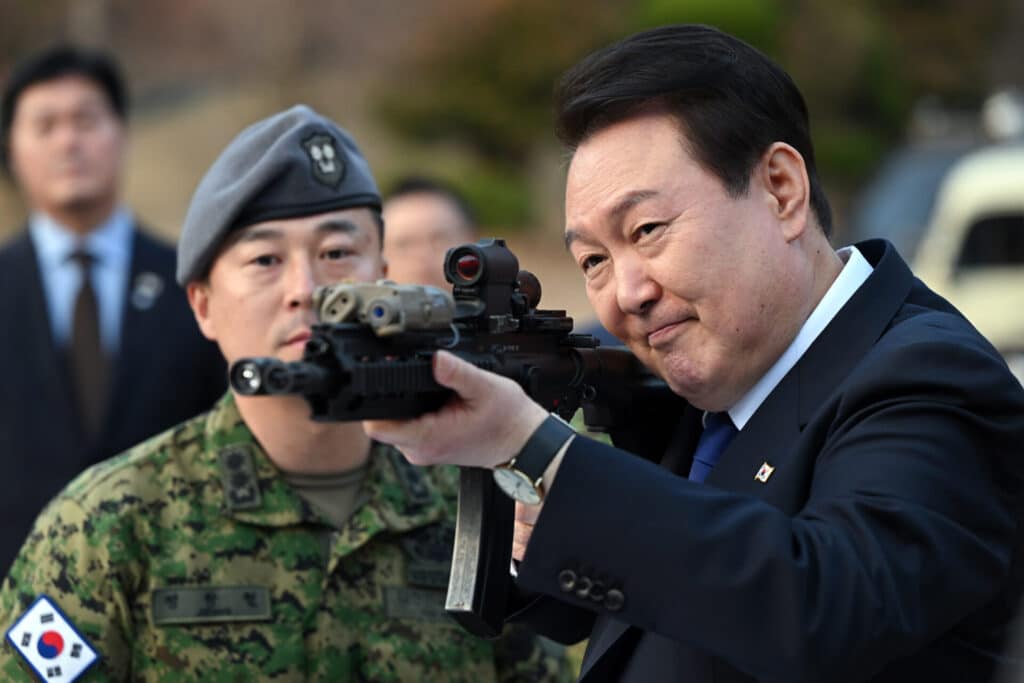


In a surprise late-night TV address, South Korean President Yoon Suk Yeol declared martial law and accused the country's opposition of controlling parliament, showing sympathy towards North Korea, and obstructing the government with anti-state activities. As photos and videos of tanks rolling into Seoul and troops securing the parliament surface, questions arise about the extent of the measures and their impact on democracy. President Yoon's popularity has declined in recent months as he struggles to push his agenda against an opposition-controlled parliament since taking office in 2022.
South Korea's Surprising Declaration of Martial Law: A Deep Dive
In a stunning turn of events, South Korean President Yoon Suk Yeol declared martial law late at night in a televised address. Accusing the opposition of undermining the government and harboring pro-North Korea sympathies, he initiated a military takeover that has raised concerns about the future of democracy in the country.
Background:
South Korea has a history of authoritarian rule, with military dictatorships dominating the political landscape from the 1960s to the 1980s. The country's democratic transition in the 1990s brought about a period of relative stability and economic growth. However, recent years have seen a resurgence of political polarization and a decline in public trust in elected officials.
President Yoon, a conservative who took office in 2022, has faced criticism for his handling of various issues, including his approach to North Korea and his attempt to relocate the presidential office. His approval ratings have plummeted, giving the opposition-controlled parliament significant leverage.
Declaration of Martial Law:
In his televised address, President Yoon accused the opposition of obstructing government initiatives, sympathizing with North Korea, and engaging in anti-state activities. He declared martial law, citing the need to restore order and protect national security.
The declaration was met with shock and disbelief. Photos and videos emerged online showing tanks rolling into Seoul and troops securing the parliament building. The extent of the military takeover and its impact on civil liberties remain unclear.
Impact on Democracy:
The declaration of martial law raises serious concerns about the future of democracy in South Korea. The military has a long history of intervening in politics, and its increased presence could undermine democratic institutions.
The opposition parties have condemned the declaration as an authoritarian power grab and have vowed to resist it. However, their ability to do so is limited, given the military's control over the government.
Top 5 FAQs:
1. What does the declaration of martial law entail?
The declaration of martial law gives the military sweeping powers to control the country. This includes the ability to detain citizens, impose curfews, and censor the media.
2. What is the basis for the declaration?
President Yoon claims that the opposition's actions pose a threat to national security and that martial law is necessary to restore order. However, critics argue that the declaration is politically motivated and that the opposition's actions do not justify such drastic measures.
3. What impact will martial law have on civil liberties?
The declaration of martial law will likely result in restrictions on civil liberties, including freedom of speech, assembly, and movement. The military may also have the power to arrest and detain people without due process.
4. What is the role of the opposition?
The opposition parties have condemned the declaration of martial law and have vowed to resist it. However, their ability to do so is limited, given the military's control over the government.
5. What does the future hold for South Korea?
The declaration of martial law has plunged South Korea into political uncertainty. The fate of democracy in the country remains unclear, and the outcome of the current crisis is uncertain.

After four years, the 'Darbar Move' tradition in Jammu and Kashmir has been restored, fulfilling the promise of the government and bringing a boost to the economy. National Conference chief Farooq Abdullah expressed happiness, noting that those who sought to separate Jammu and Srinagar have failed. Chief Minister Omar Abdullah received a warm reception and inspected the secretariat premises after the ceremony, as security in the region was heightened for the occasion.

Delhi Legislative Assembly Speaker Vijender Gupta praised Swami Dayanand Saraswati as not just a saint and reformer, but also a pivotal figure in India's freedom struggle. Speaking at the International Arya Samaj Conference, Gupta highlighted how Swami Dayanand's teachings sparked a revolution that led to the nation's independence. The event was attended by esteemed guests including Gujarat Governor Acharya Devvrat and top officials from the Arya Samaj community, all paying tribute to the enduring impact and legacy of Swami Dayanand Saraswati.

The Metro Railway Kolkata has announced a major schedule expansion for its Yellow Line, which runs between Noapara and Jai Hind Bimanbandar (Airport) in Kolkata. Starting from 3 November, weekday operations will increase to 120 services with extended operating hours, providing greater convenience and accessibility to commuters. Weekend travellers will also see a significant frequency upgrade, making travel on Saturdays and Sundays hassle-free. This move is expected to improve the overall public transportation system in the city and benefit the commuters.

Despite some reassurances that online verticals focused on diversity will continue, NBC News has announced a round of layoffs that will impact about 150 employees, or 2% of their workforce. The cuts are said to be a result of cost-cutting measures in preparation for the split of Comcast's cable networks into Versant. This move signifies a shift in priorities for NBC management, prioritizing corporate profits over hard-working members, according to Susan DeCarava, president of The NewsGuild of New York. This change also means that MSNBC will no longer lean on NBC News for newsgathering, with those ties expected to be severed next week.

The Kasibugga Venkateswara Temple in Srikakulam district was the site of a heart-wrenching stampede, causing multiple fatalities and affecting the community deeply. Chief Minister N. Chandrababu Naidu has expressed his sorrow over the unfortunate incident, as well as directing officials to ensure that those injured receive the best medical treatment possible. As local officials and public representatives are called to oversee relief operations, swift action is required to aid those affected and manage the situation effectively.

Indian Prime Minister Narendra Modi inaugurated the Shanti Shikhar Academy for Peaceful World in Raipur, praising the Brahma Kumaris organization for bridging India's ancient wisdom with the world's search for harmony. He credited the group's selfless service and spiritual discipline for their efforts towards universal peace. He positioned the Brahma Kumaris as protectors of India's soul and highlighted India's proactive role in addressing global crises such as disaster relief and environmental threats.

In an act of solidarity and protest, millions of Muslims in India used their Friday prayers to denounce the recent killings that took place in Pahalgam. The news comes amid growing tensions between the Muslim community and the Indian government. Many are viewing this as a sign of unity and determination from the Muslim population in India.

The state of Karnataka, or Kannada Rajyotsava, marked its 69th anniversary with a grand ceremony organized by the district administration in Mangaluru. District in-charge minister Dinesh Gundu Rao paid tribute to the leaders and writers who fought for a unified Kannada state and presented awards to 80 outstanding individuals and organizations. In his address, the minister highlighted the rich cultural and historical heritage of Karnataka and called for a sense of pride among its citizens.

Telangana's 'Run for Unity' event marked the 150th birth anniversary of Sardar Vallabhbhai Patel, India's first Deputy Prime Minister and architect of national integration. The event, carrying the message of "Ek Bharat - Shreshth Bharat", honored Patel's legacy of unity, sacrifice, and nation-building. Telangana BJP President N Ramachander Rao paid tribute to Patel and highlighted his pivotal role in integrating princely states, including Hyderabad, into the Indian Union. He also commended Prime Minister Narendra Modi and Home Minister Amit Shah for upholding Patel's ideals of national integrity.

The FBI has successfully stopped a potential terrorist attack in Michigan on Halloween weekend, according to FBI Director Kash Patel. Multiple suspects have been arrested after allegedly planning a violent attack that was connected to international terrorism. The suspects, whose ages range from 16 to 20, had engaged in firearms training and mentioned "pumpkin day" as a code for Halloween. White House Senior Director for Counterterrorism Seb Gorka confirmed the thwarted attack and stated that it was intended to occur during a time when children should be enjoying themselves.